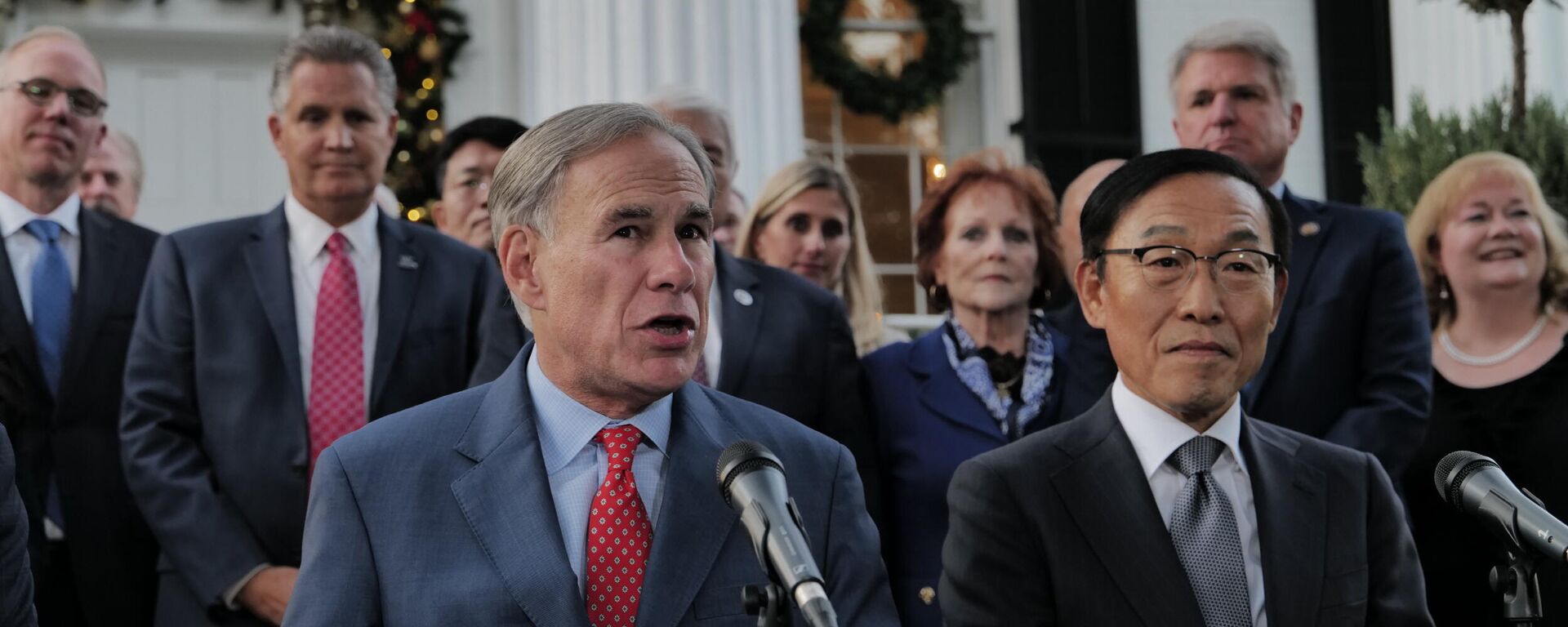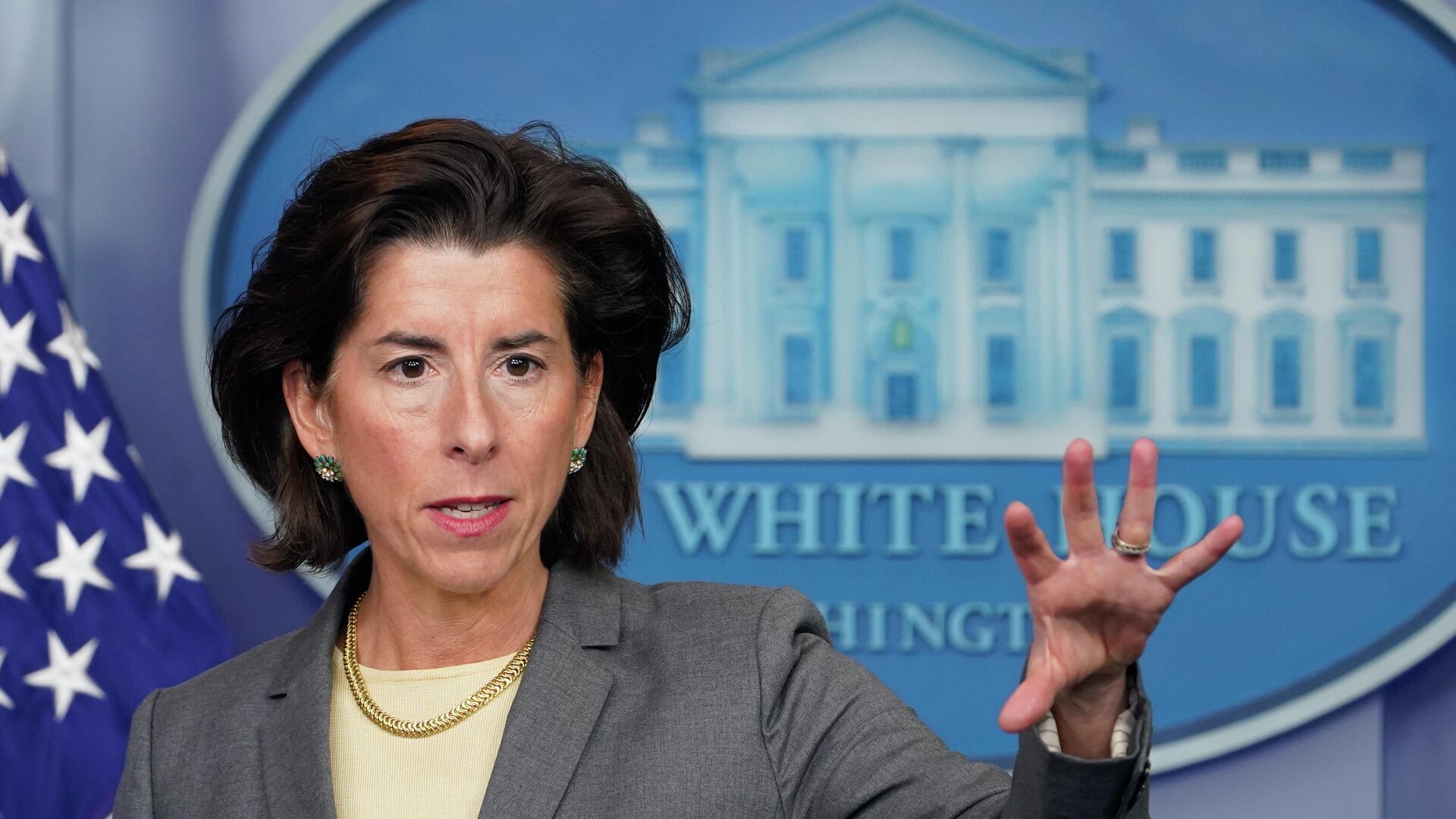https://sputnikglobe.com/20211129/commerce-sec-urges-house-to-pass-act-supporting-manufacture-of-semiconductors-in-us---report-1091123716.html
Commerce Sec. Urges House to Pass Act Supporting Manufacture of Semiconductors in US - Report
Commerce Sec. Urges House to Pass Act Supporting Manufacture of Semiconductors in US - Report
Sputnik International
The production of everything from appliances to automobiles is being slowed by a global chip shortage not only in the US, but in the rest of the world as well... 29.11.2021, Sputnik International
2021-11-29T23:44+0000
2021-11-29T23:44+0000
2021-11-29T23:44+0000
us
shortage
us commerce department
chip
shortages
microchip
commerce
us-china trade war
https://cdn1.img.sputnikglobe.com/img/07e5/0b/1d/1091124667_0:32:3073:1760_1920x0_80_0_0_6db8497a42ba15262e47c41822d019e9.jpg
US Commerce Secretary Gina Raimondo has encouraged the House to pass legislation supporting US semiconductor chip production as soon as possible to avoid future supply disruptions and reduce the country's reliance on Chinese parts, CNBC reported on Monday.Raimondo discussed the ongoing global chip shortage that has depleted car inventory levels and forced rolling shutdowns of US auto facilities as proof that the country needs to onshore its supply chains for vital components like semiconductor chips.She also pointed out that US chip assembly now accounts for only 12% of worldwide output, down from 40% in the 1990s.The bill in question, the United States Innovation and Competition Act, or USICA, has yet to be passed by the House of Representatives. The CHIPS Act, or Creating Helpful Incentives to Produce Semiconductors for America Act, which is hidden into the bigger competitiveness package, provides $52 billion for domestic semiconductor production and incentives to invest in new semiconductor manufacturing facilities in the US, as well as the establishment of a National Semiconductor Technology Center.Raimondo also stressed that the US can not wait any longer to take action because "the rest of the world isn’t waiting."The global chip shortage has wreaked havoc on the car industry, but Detroit automakers have been hit harder than others, experts in the media noted. According to consultancy firm AlixPartners' September estimates, the global automobile sector is set to lose $210 billion in revenue this year due to scarcity.Automobile manufacturers such as Ford and General Motors have declared plans to work more closely with semiconductor suppliers, even forming partnerships, in order to avoid future shortages, per reports. While some believe the worst of the semiconductor crisis has passed, the Biden administration has pushed for more American manufacturing of vital components such as chips for the automotive industry and other industries.As the US automotive sector begins to produce more electric vehicles, Raimondo stressed her belief that growing domestic chip production is crucial. By 2030, the Biden administration wants electric vehicles to account for 50% of all new car sales in the nation. Overall, Raimondo used the occasion to promote both the semiconductor bill and Biden's Build Back Better Act, which is currently awaiting Senate action.With Congress already preoccupied with a jam-packed legislative agenda, it is unclear whether the lower chamber will have time to pass the bill and send it to President Joe Biden for signature before the end of the calendar year.
https://sputnikglobe.com/20211124/texas-to-host-samsungs-new-17bn-computer-chip-plant-tech-giants-biggest-us-investment-1090983222.html
Sputnik International
feedback@sputniknews.com
+74956456601
MIA „Rossiya Segodnya“
2021
News
en_EN
Sputnik International
feedback@sputniknews.com
+74956456601
MIA „Rossiya Segodnya“
Sputnik International
feedback@sputniknews.com
+74956456601
MIA „Rossiya Segodnya“
us, shortage, us commerce department, chip, shortages, microchip, commerce, us-china trade war
us, shortage, us commerce department, chip, shortages, microchip, commerce, us-china trade war
Commerce Sec. Urges House to Pass Act Supporting Manufacture of Semiconductors in US - Report
Kirill Kurevlev
Managing Editor
The production of everything from appliances to automobiles is being slowed by a global chip shortage not only in the US, but in the rest of the world as well. The Senate passed a bill with $52 billion for domestic semiconductor manufacturing in June, but the House has yet to act.
US Commerce Secretary Gina Raimondo has encouraged the House to pass legislation supporting US semiconductor chip production as soon as possible to avoid future supply disruptions and reduce the country's reliance on Chinese parts, CNBC
reported on Monday.
Raimondo discussed the ongoing global chip shortage that
has depleted car inventory levels and forced rolling shutdowns of US auto facilities as proof that the country needs to onshore its supply chains for vital components like semiconductor chips.
"If we want to compete globally, we invest domestically, and specifically in revitalizing the semiconductor industry," Raimondo said in her speech at
the Detroit Economic Club. She also pointed out that US chip assembly now accounts for only 12% of worldwide output, down from 40% in the 1990s.
The bill in question, the United States Innovation and Competition Act, or USICA, has yet to be passed by the House of Representatives. The CHIPS Act, or Creating Helpful Incentives to Produce Semiconductors for America Act, which is hidden into the bigger competitiveness package, provides $52 billion for domestic semiconductor production and incentives to invest in new semiconductor manufacturing facilities in the US, as well as the establishment of a National Semiconductor Technology Center.
Raimondo also stressed that the US can not wait any longer to take action because "the rest of the world isn’t waiting."
"China, Taiwan - they are incentivizing the production of chips right now and have been for a long time. We need the House to pass the CHIPS Act immediately so we can get to the business of doing this," the secretary of commerce said.
The global chip shortage has wreaked havoc on the car industry, but Detroit automakers have been hit harder than others, experts in the media noted. According to consultancy firm AlixPartners' September estimates, the global automobile sector
is set to lose $210 billion in revenue this year due to scarcity.
Automobile manufacturers such as Ford and General Motors have declared plans to work more closely with semiconductor suppliers, even forming partnerships, in order to avoid future shortages,
per reports. While some believe the worst of the semiconductor crisis has passed, the Biden administration has pushed for more American manufacturing of vital components such as chips for the automotive industry and other industries.

24 November 2021, 11:09 GMT
As the US automotive sector begins to produce more electric vehicles, Raimondo stressed her belief that growing domestic chip production is crucial.
By 2030, the Biden administration
wants electric vehicles to account for 50% of all new car sales in the nation.
"It's an excellent goal," Raimondo remarked, but "the truth of the matter is that requires a lot of chips." According to the commerce secretary, as cited in the report, the average electric vehicle contains about 2,000 chips, which is roughly double the average amount of chips in a non-electric vehicle.
Overall, Raimondo used the occasion to promote both the semiconductor bill and Biden's Build Back Better Act, which is currently awaiting Senate action.
With Congress already preoccupied with a
jam-packed legislative agenda, it is unclear whether the lower chamber will have time to pass the bill and send it to President Joe Biden for signature before the end of the calendar year.


